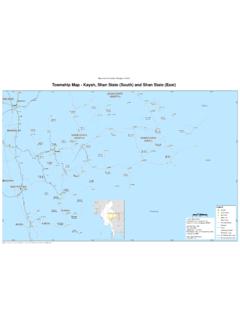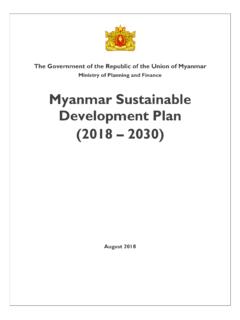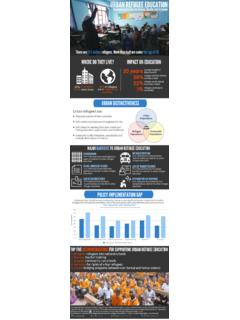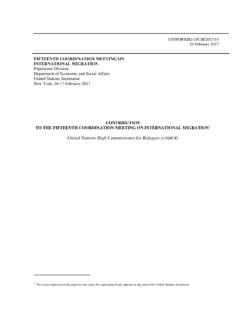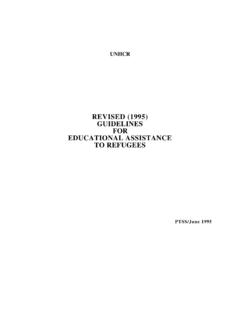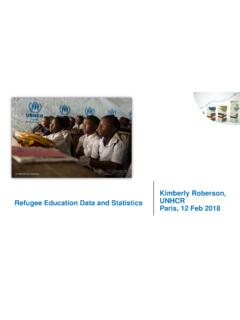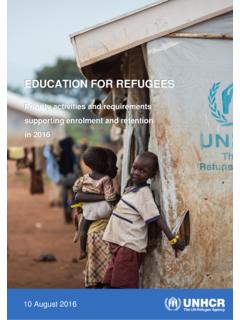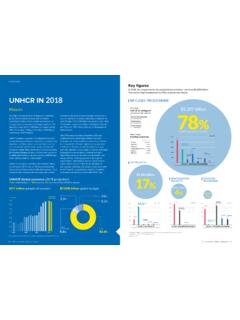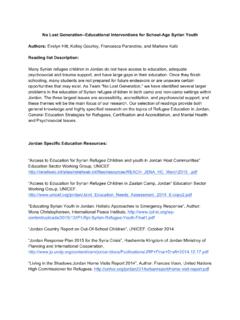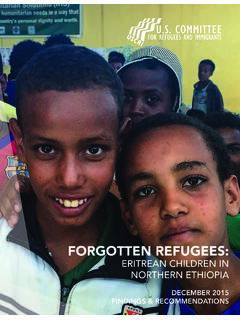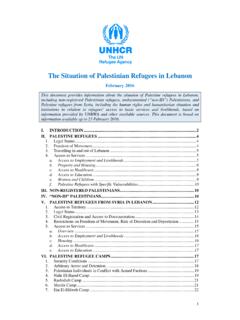Transcription of Beyond Access: Refugee Students’ Experiences of …
1 Supporting Thailand Country Office Beyond access : Refugee students Experiences of Myanmar State education Aoife Dare Independent Consultant January, 2015 Save the Children: Beyond access Report 2 Table of Contents EXECUTIVE SUMMARY 4 INTRODUCTION 6 BACKGROUND 6 METHODOLOGY 7 CURRENT POLICY 8 FINDINGS 8 access 8 UNOFFICIAL MEANS 9 PLACEMENT TESTS 9 DOCUMENTATION 10 FEES 10 CHALLENGES 11 LANGUAGE OF INSTRUCTION 11 CURRICULUM 12 INTEGRATION 13 SUPPORT 14 ACADEMIC 14 PSYCHOSOCIAL 14 FINANCIAL 15 CONCLUSION 15 Save the Children: Beyond access Report 3 List of Acronyms ADRA Adventist Relief and Development Agency DFAT Department of Foreign Affairs and Trade EU European Union GoUM Government of the Union of Myanmar JRS Jesuit Refugee Service KED Karen education Department KNU Karen National Union KnED Karenni education Department KRCEE Karen Refugee Committee education Entity MoE Ministry of education RTG Royal Thai Government TBC The Border Consortium TEO Township education Officer UNHCR United Nations High Commission for refugees ZOA Zuid-Oost Azie Refugee Care Save the Children.
2 Beyond access Report 4 Executive Summary This research was commissioned by Save the Children International (SCI) Thailand Country Office on behalf of its local partners in order to gain an understanding of the realities facing returning Refugee students who are accessing Myanmar state education services. This report provides a snapshot into the Experiences of eight (8) students who have returned to Myanmar and are attending government schools as well as three (3) students who were unable to access government schools so are attending private schools. This information is strengthened with data gleaned from interviews with six (6) parents and 12 key informants.
3 The Government of the Union of Myanmar s (GoUM) current policy on accepting returning Refugee students into state education requires students to sit a placement test before being accepted into government schools. Placement tests purportedly exist for Myanmar/Burmese, English and Mathematics. When a returning student wishes to join a government school, s/he needs to provide the documentation from her/his previous school and s/he can then sit the placement test. For example, a student who completes Grade 5 in Myanmar (that is, primary school), studies for two years on the border and then returns to Myanmar after completing Grade 7, must sit the Grade 6 placement test.
4 The situation for students born in Thailand without Myanmar ID or documentation is unclear and needs further research. Summary of Key Findings access Placement tests are not systematically implemented: Only three students had experience of sitting placement tests one of these students is attending a government school but the other two are at a private school. The documentation required to access government schools varies. Official and unofficial fees are applied in some cases: Some parents report paying enrolment fees as well as unofficial fees.
5 Other parents did not have to pay any fees. Unofficial means of gaining access to government schools are used, such as bribery and personal relationships. Head teachers use their discretion to accept or decline access to government schools. Challenges Language of instruction: the majority of students in this study said they were coping with Myanmar as the language of instruction. Two students reported having problems. Curriculum: the majority of the students in the sample were facing difficulties adapting to the new curriculum. Support None of the students in this study were receiving any kind of targeted academic or psychosocial support, however key informants thought that this kind of support should be provided.
6 Two parents mentioned receiving small sums of money from the school for each child upon enrolment. There were also reports of tuition being provided for free and one parent not having to pay enrolment fees or give a rice donation because she had come from the camp. Save the Children: Beyond access Report 5 Recommendations The policy on accepting Refugee students into government schools, including exactly what documentation is needed, should be further clarified with the Myanmar Ministry of education . Once this information is certain, it should be disseminated widely to Refugee parents, families and students who are planning or thinking of returning to Myanmar.
7 Refugee students , particularly those who are intending to sit the matriculation exam, should be given more exposure to the Myanmar curriculum (particularly Myanmar language subject) before they leave camp. Middle and high school students should be provided with the opportunity to attend intensive Myanmar language courses. Further research is needed to determine how students are integrating linguistically at school. There should be a concerted effort to prepare students on both sides of the border for integration, particularly regarding developing an understanding of each others Experiences and backgrounds.
8 It could be useful for there to an information sharing campaign between camp schools/teachers and Myanmar schools/teachers. Information on both education systems should also be more widely shared among CBO staff on both sides of the border. More research is necessary in order to truly understand the psychosocial support needs of returning Refugee students . Myanmar government teachers should be provided with in-service training which equips them to facilitate the successful integration of Refugee student as well as support these students , some of whom may be unaccompanied, face academic challenges and/or face psychosocial issues.
9 Save the Children: Beyond access Report 6 Introduction Save the Children International (Thailand Country Office) and partners have been supporting Refugee education on the Thailand-Myanmar border since 2011. Due to the recent political changes in Myanmar, there is speculation that large scale organised voluntary repatriation may be possible in the short to medium term. Therefore, preparing for the return of refugees and finding durable education solutions has become a priority. A key element of establishing durable education solutions is facilitating the return and integration of tens of thousands of Refugee students into the Myanmar state education system, should they chose to return to areas where state education services are Although it is not known exactly how many Refugee students have already returned to Myanmar, it is estimated that since the start of this academic year (2014/15)
10 Alone, at least 48 refugees have The objective of this study is to better understand the realities facing returning Refugee students who are accessing the Myanmar government education system. Using Kayin State and Kayah States as a case study, this research provides insight into the following questions: How are returning Refugee students accessing government schools in Kayin and Kayah States? What are the challenges facing Refugee students who are attending government schools? What support are they receiving, or should be receiving, to deal with these challenges?
